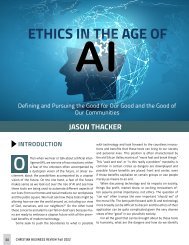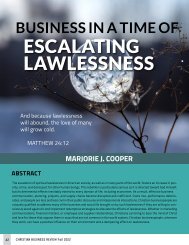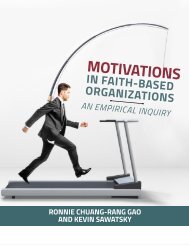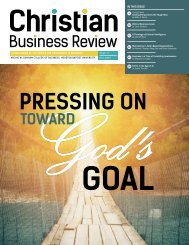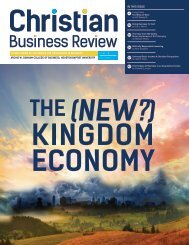Christian Business Review 2018: Kingdom Business in the Brave New World (Issue 7)
You also want an ePaper? Increase the reach of your titles
YUMPU automatically turns print PDFs into web optimized ePapers that Google loves.
economics, privacy, and ethics<br />
rash of privacy issues that we are deal<strong>in</strong>g with now is <strong>the</strong><br />
result of an economic system <strong>in</strong> which specialization and<br />
trade have rapidly changed <strong>the</strong> nature of commerce. On<br />
<strong>the</strong> one hand, technology and scale have made consumer<br />
oversight of commercial practices almost impossible,<br />
and made relationship-centered commerce rare. On <strong>the</strong><br />
o<strong>the</strong>r hand, <strong>the</strong>se same technologies have facilitated <strong>the</strong><br />
creation of new communities and networks across great<br />
physical distance. This leads to a quandary for <strong>Christian</strong><br />
social ethicists: what does a <strong>the</strong>ology that is centered<br />
around restor<strong>in</strong>g relationships have to say about a system<br />
that makes people genu<strong>in</strong>ely better off while m<strong>in</strong>imiz<strong>in</strong>g<br />
personal relationships and accountability <strong>in</strong> some cases,<br />
and creat<strong>in</strong>g new (and different) communities <strong>in</strong> o<strong>the</strong>r<br />
cases? More practically, what would an ethical use of personal<br />
<strong>in</strong>formation look like <strong>in</strong> this context?<br />
While <strong>the</strong>se and related concerns have motivated<br />
some to make a radical shift toward local economies<br />
or away from commercial capitalism, 3 this would be<br />
extremely harmful. I will argue, <strong>in</strong>stead, that a more nuanced<br />
response is warranted. We can embrace <strong>the</strong> economic<br />
benefits of technology while also us<strong>in</strong>g <strong>the</strong>ology to<br />
guide us <strong>in</strong> protect<strong>in</strong>g <strong>the</strong> relational element of economic<br />
<strong>in</strong>teractions whenever possible. This could happen <strong>in</strong> two<br />
ways. First, prioritiz<strong>in</strong>g relationships <strong>in</strong> economic life will<br />
sometimes motivate strict legal protections of <strong>in</strong>dividual<br />
<strong>in</strong>formation, while at o<strong>the</strong>r times it will justify openness<br />
to technologically-mediated commerce when it complements<br />
personal <strong>in</strong>teractions. Second, pr<strong>in</strong>cipled <strong>Christian</strong><br />
bus<strong>in</strong>ess-people should commit to long-term credible<br />
commitments to transparent use of data. Do<strong>in</strong>g so would<br />
help create a culture and expectation of honesty and openness<br />
<strong>in</strong> data use.<br />
The Economic Context of Privacy Concerns<br />
As Adam Smith famously wrote, <strong>the</strong> ability of a person to<br />
specialize <strong>in</strong> <strong>the</strong>ir most productive tasks is limited by “<strong>the</strong><br />
extent of <strong>the</strong> market.” 4 The story of economic progress <strong>in</strong><br />
<strong>the</strong> western world s<strong>in</strong>ce <strong>the</strong> <strong>in</strong>dustrial revolution has been<br />
one <strong>in</strong> which people’s ability to specialize has steadily expanded.<br />
This expansion resulted from <strong>the</strong> steady growth<br />
of trade, facilitated by reduced trade barriers, better governance,<br />
better communications technology, and advances<br />
<strong>in</strong> transportation. This same process has been accelerated<br />
<strong>in</strong> recent years by <strong>the</strong> emergence of e-commerce and social<br />
media. Specialization has now progressed to <strong>the</strong> po<strong>in</strong>t<br />
where people are constantly, unknow<strong>in</strong>gly, <strong>in</strong>teract<strong>in</strong>g<br />
with thousands of o<strong>the</strong>r people that <strong>the</strong>y will never meet. 5<br />
This process is <strong>the</strong> foundation of <strong>in</strong>creased standards of<br />
liv<strong>in</strong>g across <strong>the</strong> globe, and is thus worth cheer<strong>in</strong>g.<br />
Consider, <strong>in</strong> this context, two types of transactions.<br />
The first I will call a “local” transaction. In this simple case,<br />
<strong>the</strong> customer (i) knows <strong>the</strong> person sell<strong>in</strong>g <strong>the</strong>m <strong>the</strong> product<br />
that <strong>the</strong>y buy, (ii) knows or has access to extensive<br />
knowledge about <strong>the</strong> product that <strong>the</strong>y are buy<strong>in</strong>g, (iii)<br />
knows exactly what useful <strong>in</strong>formation <strong>the</strong>y are giv<strong>in</strong>g to<br />
<strong>the</strong> seller, and (iv) knows (and tacitly approves) of <strong>the</strong> use<br />
that seller might make of that <strong>in</strong>formation. These are <strong>the</strong><br />
sort of transactions that draw people to farmers markets<br />
and local bus<strong>in</strong>esses. Most notably, <strong>the</strong>se transactions are<br />
common <strong>in</strong> environments where collect<strong>in</strong>g and us<strong>in</strong>g consumer<br />
data is ei<strong>the</strong>r technologically limited or <strong>the</strong> scale<br />
is too small for consumer data collection to be valuable.<br />
While <strong>the</strong>se k<strong>in</strong>ds of transactions can have numerous<br />
problems, <strong>in</strong>clud<strong>in</strong>g concerns about privacy, <strong>the</strong> privacy<br />
concerns are those that normally occur <strong>in</strong> community,<br />
and are thus foreseeable and able to be mitigated by o<strong>the</strong>r<br />
practices.<br />
I will label <strong>the</strong> second type a “distant” transaction. In<br />
this case, <strong>the</strong> customer (i) buys a product without know<strong>in</strong>gly<br />
<strong>in</strong>teract<strong>in</strong>g with ano<strong>the</strong>r person, (ii) purchases a<br />
product whose production methods <strong>the</strong>y are <strong>in</strong>capable<br />
of trac<strong>in</strong>g, (iii) has little knowledge about <strong>the</strong> nature of<br />
<strong>the</strong> <strong>in</strong>formation that is available about <strong>the</strong>m as a result of<br />
<strong>the</strong> transaction, and (iv) has little knowledge of how <strong>the</strong>ir<br />
<strong>in</strong>formation can be used to profit <strong>the</strong> seller or <strong>the</strong> public to<br />
whom it might be available. This is <strong>the</strong> sort of transaction<br />
that happens when you buy almost anyth<strong>in</strong>g from Amazon,<br />
consume media onl<strong>in</strong>e, or participate <strong>in</strong> a social network.<br />
In fact, <strong>the</strong> “distant” transaction described is extreme, but<br />
it is still a better description of almost all commercial life<br />
<strong>in</strong> <strong>the</strong> U.S. today than is <strong>the</strong> “local” transaction described<br />
first. Moreover, even though much of <strong>the</strong> time people are<br />
engag<strong>in</strong>g <strong>in</strong> “distant” transactions, we still often behave as<br />
if most transactions are of <strong>the</strong> “local” variety.<br />
The move toward this type of distant transaction is not<br />
all bad. Our wealth and our health are largely attributable<br />
to <strong>the</strong> specialization and scale which leads <strong>in</strong>evitably to<br />
transactions with this complexity and social distance.<br />
Moreover, <strong>in</strong> this complicated environment, a little judicious<br />
commercial use of personal data can be a good th<strong>in</strong>g.<br />
When <strong>in</strong>ternet search eng<strong>in</strong>es learn your demographic<br />
characteristics and tastes, you are more likely to see advertisements<br />
for goods that <strong>in</strong>terest you, which is usually<br />
good for everyone. In terms of market efficiency, <strong>in</strong> fact,<br />
<strong>the</strong> shar<strong>in</strong>g of <strong>in</strong>formation is often a net ga<strong>in</strong> for all parties.<br />
6 Moreover, it is often <strong>the</strong> case that consumers opt <strong>in</strong>to<br />
trusted networks where <strong>the</strong>y will have reputations or be<br />
“known.” Consumer profiles dramatically reduce transaction<br />
costs, as consumers are able to quickly f<strong>in</strong>d <strong>the</strong> goods<br />
and services <strong>the</strong>y desire. As <strong>the</strong> scale of <strong>the</strong> market grows,<br />
<strong>in</strong> fact, <strong>the</strong> benefits to consumers from this k<strong>in</strong>d of <strong>in</strong>formation-based<br />
profil<strong>in</strong>g grow as well.<br />
Abuse of Information<br />
CBR PEER REVIEWED ARTICLES<br />
In some cases, even though efficient, accessible personal<br />
data can be used <strong>in</strong> ways that consumers dislike. Young<br />
women who purchase a pregnancy test at a large retailer<br />
CHRISTIAN BUSINESS REVIEW fall <strong>2018</strong> 41




